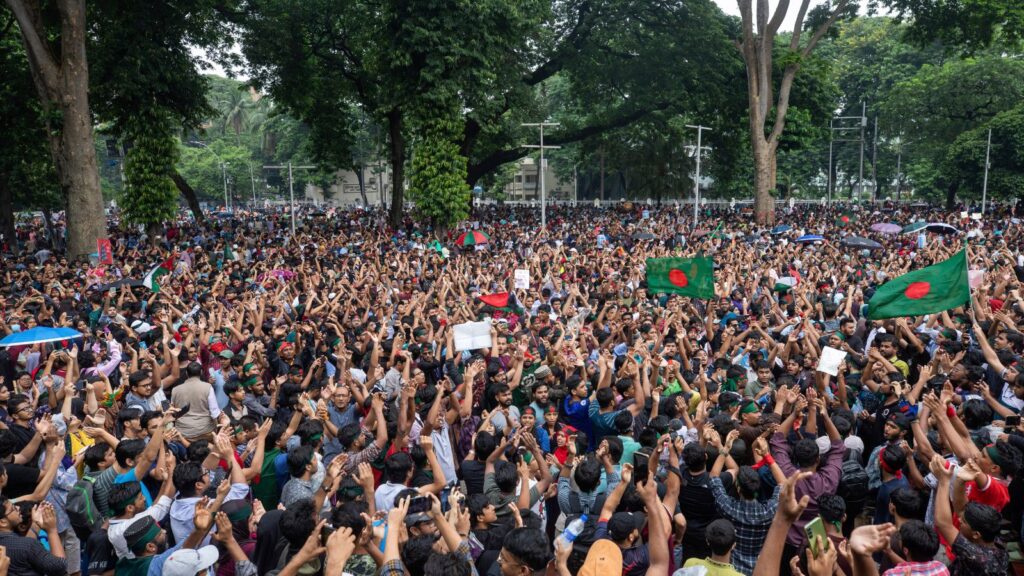Literature has long been a powerful tool for exploring the nuances of human experience, and it is most evident in its role in articulating the struggles, aspirations, and emotions of those involved in protests and rebellions. Literature can unite people with shared beliefs, fostering a sense of solidarity among those who oppose fascism. It can create a collective identity around shared values, strengthening the resolve of resistance movements. It can also give a voice to those who are oppressed or marginalized, helping to unite diverse groups in the struggle against fascism. From the French Revolution to the Bangladeshi student-led Anti-discrimination Movement 2024, history has shown us how literature and satire can be powerful weapons to expose injustice and become the language of resistance. The language of the latest student protest in Bangladesh is marked by deep-seated anger against injustice and a hope for freedom by a generation that has long felt marginalized by an entrenched system. The students’ strategic use of popular literature and media references, including Harry Potter, Game of Thrones, Animal Farm, and even Attack on Titan, distinguished this student movement as it articulated their discontent and mobilized support.
“Why do fireflies have to die so soon?”
The mass killing led by the dictator and her men gave us the news of brutal killings all over the country, even claiming the life of a little girl of just five years. Things started to look hopeless, and people were terrified of being killed by their government, even within the safety of their homes. It was like the war scene from Grave of the Fireflies, where innocent children die, being the collateral damage of a corrupted regime.

The Fight Against the Dark Lord
In J.K. Rowling’s Harry Potter series, the battle between Harry Potter and Voldemort represents more than just a fight between good and evil; it symbolizes a struggle against an oppressive regime. In this movement, we Bangladeshi students saw ourselves as the resistance, like Harry and his allies, fighting an entrenched political class that had become increasingly dictatorial. The final battle at Hogwarts, where students and teachers united to resist Voldemort’s forces, served as a powerful metaphor for the collective action and solidarity from authorities needed to overcome the forces of repression in our own country.
“Power is Power”
Game of Thrones and House of the Dragon offered rich metaphors for the students. Both shows portray the ruthless quest for power, political intrigues, and betrayal – themes this generation found all too relatable to the real-life maneuvers of their political leaders. Students drew parallels between the cruelty and cynicism of the show’s characters and the behaviour of their own political elite. The call to “Break the Wheel”, referencing Daenerys Targaryen’s vow to end the cycle of tyranny, encapsulated the students’ desire to tear down the structures of power that perpetuated inequality and oppression. Winter came for the political system that had failed its people.
“All animals are equal, but some animals are more equal than others”
George Orwell’s Animal Farm served as a satirical mirror to the political realities in Bangladesh. The metaphorical tale of animals overthrowing their human oppressor only to see the rise of a new, equally oppressive regime resonated with the students, who were wary of the potential for their movement to be overshadowed by opportunistic leaders. The quota reform movement challenged this very hypocrisy of unfairly favouring the grandchildren of freedom fighters in the name of respect. “Will the razakar children get opportunities if not children of freedom fighters?” this line was a punch to the gut, reflecting the corrupting influence of power in Animal Farm, which served as a cautionary tale to remind the students to stay vigilant against the oppressive power of the ruler.
The Dual Edge of Freedom
Freedom is hard to earn and more challenging to maintain. On the 5th of August, the people celebrated their hard-won victory after the fall of the dictator. A new symbol emerged – the image of Eren Yeager from Attack on Titan, accompanied by the caption “This is freedom.” But the euphoria was short-lived. On that very day, violence erupted as minorities, politicians’ families, and police officers were targeted by the mobs, exposing the divisions and mob mentality that still plagued the nation. There was the joy of breaking free from tyranny and the reminder to ensure that all members of society can share that freedom. The use of Eren’s image showed us the complexity of his character, embodying both the relentless pursuit of freedom and the moral ambiguities that come with it. The very day that marked our victory also revealed the fragility of our success, as violence against marginalized communities underscored the unfinished work of achieving genuine liberation. The battle for a just and inclusive society was far from over.
Literature as a Tool for Resistance
The 2024 student-led movement in Bangladesh demonstrated the enduring power of literature and popular culture as tools for resistance. It can shape consciousness, mobilize action, and sustain resistance. By challenging oppressive ideologies, inspiring solidarity, and imagining alternatives, literature plays a crucial role in the fight against fascism and the broader struggle for justice and freedom. The students showed that the power of stories extends beyond the pages of books or the screens of television shows. The generation that grew up reading detective stories like Masud Rana and Tin Goyenda could easily decipher what was right or wrong among all the political schemes. These literary references provided a common language that united the movement, allowing students from diverse backgrounds to rally around shared symbols and metaphors.